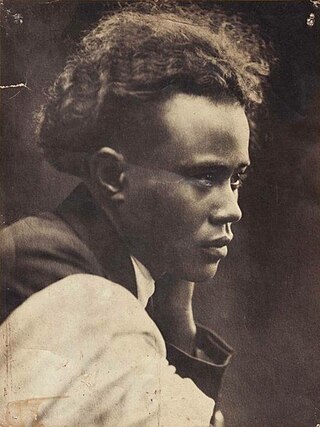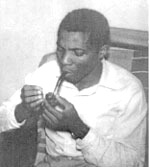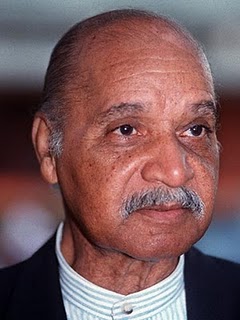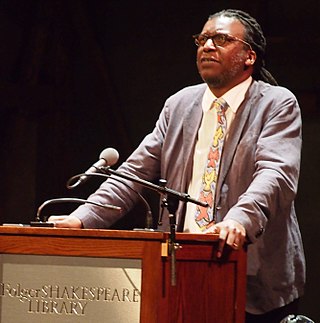Postcolonial literature is the literature by people from formerly colonized countries, originating from all continents except Antarctica. Postcolonial literature often addresses the problems and consequences of the decolonization of a country, especially questions relating to the political and cultural independence of formerly subjugated people, and themes such as racialism and colonialism. A range of literary theory has evolved around the subject. It addresses the role of literature in perpetuating and challenging what postcolonial critic Edward Said refers to as cultural imperialism.

Jean-Joseph Rabearivelo, born Joseph-Casimir Rabearivelo, was a Malagasy poet who is widely considered to be Africa's first modern poet and the greatest literary artist of Madagascar. Part of the first Malagasy generation raised under French colonization, Rabearivelo grew up impoverished and failed to complete secondary education. His passion for French literature and traditional Malagasy oral poetry (hainteny) prompted him to read extensively and educate himself on a variety of subjects, including the French language and its poetic and prose traditions. He published his first poems as an adolescent in local literary reviews, soon obtaining employment at a publishing house where he worked as a proofreader and editor of its literary journals. He published numerous poetry anthologies in French and Malagasy as well as literary critiques, an opera, and two novels.
Négritude is a framework of critique and literary theory, mainly developed by francophone intellectuals, writers, and politicians in the African diaspora during the 1930s, aimed at raising and cultivating "black consciousness" across Africa and its diaspora. Négritude gathers writers such as sisters Paulette and Jeanne Nardal, Martinican poet Aimé Césaire, Abdoulaye Sadji, Léopold Sédar Senghor, and Léon Damas of French Guiana. Négritude intellectuals disavowed colonialism, racism and Eurocentrism. They promoted African culture within a framework of persistent Franco-African ties. The intellectuals employed Marxist political philosophy, in the black radical tradition. The writers drew heavily on a surrealist literary style, and some say they were also influenced somewhat by the Surrealist stylistics, and in their work often explored the experience of diasporic being, asserting one's self and identity, and ideas of home, home-going and belonging.

Christopher Ifekandu Okigbo was a Nigerian poet, teacher, and librarian, who died fighting for the independence of Biafra. He is today widely acknowledged as an outstanding postcolonial English-language African poet and one of the major modernist writers of the 20th century.
Gabriel Imomotimi Okara was a Nigerian poet and novelist who was born in Bumoundi in Yenagoa, Bayelsa State, Nigeria. The first modernist poet of Anglophone Africa, he is best known for his early experimental novel, The Voice (1964), and his award-winning poetry, published in The Fisherman's Invocation (1978) and The Dreamer, His Vision (2005). In both his poems and his prose, Okara drew on African thought, religion, folklore and imagery, and he has been called "the Nigerian Negritudist". According to Brenda Marie Osbey, editor of his Collected Poems, "It is with publication of Gabriel Okara's first poem that Nigerian literature in English and modern African poetry in this language can be said truly to have begun."

José Craveirinha was a Mozambican journalist, story writer and poet, who is today considered the greatest poet of Mozambique. His poems, written in Portuguese, address such issues as racism and the Portuguese colonial domination of Mozambique. A supporter of the anti-Portuguese group FRELIMO during the colonial wars, he was imprisoned in the 1960s. He was one of the African pioneers of the Négritude movement, and published six books of poetry between 1964 and 1997. Craveirinha also wrote under the pseudonyms Mário Vieira, José Cravo, Jesuíno Cravo, J. Cravo, J.C., Abílio Cossa, and José G. Vetrinha.
The poetry of South Africa covers a broad range of themes, forms and styles. This article discusses the context that contemporary poets have come from and identifies the major poets of South Africa, their works and influence.
African American literature is the body of literature produced in the United States by writers of African descent. Olaudah Equiano was an African man who wrote The Interesting Narrative of the Life of Olaudah Equiano, an autobiography published in 1789 that became one of the first influential works about the transatlantic slave trade and the experiences of enslaved Africans. His work was published sixteen years after Phillis Wheatley's work. She was an enslaved African woman who became the first African American to publish a book of poetry, which was published in 1773. Her collection, was titled Poems on Various Subjects, Religious and Moral.

Nigerian literature may be roughly defined as the literary writing by citizens of the nation of Nigeria for Nigerian readers, addressing Nigerian issues. This encompasses writers in a number of languages, including not only English but Igbo, Urhobo, Yoruba, and in the northern part of the county Hausa and Nupe. More broadly, it includes British Nigerians, Nigerian Americans and other members of the African diaspora.
African literature is literature from Africa, either oral ("orature") or written in African and Afro-Asiatic languages. Examples of pre-colonial African literature can be traced back to at least the fourth century AD. The best-known is the Kebra Negast, or "Book of Kings" from the 14th century AD. Another well-known book is the Garima Gospels, one of the oldest known surviving bibles in the world, written in Ge'ez around 500 AD.

Cornelius Eady is an American writer focusing largely on matters of race and society. His poetry often centers on jazz and blues, family life, violence, and societal problems stemming from questions of race and class. His poetry is often praised for its simple and approachable language.
Latin American poetry is the poetry written by Latin American authors. Latin American poetry is often written in Spanish, but is also composed in Portuguese, Mapuche, Nahuatl, Quechua, Mazatec, Zapotec, Ladino, English, and Spanglish. The unification of Indigenous and imperial cultures produced a unique and extraordinary body of literature in this region. Later with the introduction of African slaves to the new world, African traditions greatly influenced Latin American poetry. Many great works of poetry were written in the colonial and pre-colonial time periods, but it was in the 1960s that the world began to notice the poetry of Latin America. Through the modernismo movement, and the international success of Latin American authors, poetry from this region became increasingly influential.
Sudanese literature consists of both oral as well as written works of fiction and nonfiction that were created during the cultural history of today's Republic of the Sudan. This includes the territory of what was once Anglo-Egyptian Sudan, the independent country's history since 1956 as well as its changing geographical scope in the 21st century.

Algerian literature has been influenced by many cultures, including the ancient Romans, Arabs, French, Spanish, and Berbers. The dominant languages in Algerian literature are French and Arabic.

Senegalese literature is written or literary work which has been produced by writers born in the West African state. Senegalese literary works are mostly written in French, the language of the colonial administration. However, there are many instances of works being written in Arabic and the native languages of Wolof, Pulaar, Mandinka, Diola, Soninke and Serer. Oral traditions, in the form of Griot storytellers, constitute a historical element of the Senegalese canon and have persisted as cultural custodians throughout the nation's history. A form of proto-Senegalese literature arose during the mid 19th century with the works of David Abbé Boilat, who produced written ethnographic literature which supported French Colonial rule. This genre of Senegalese literature continued to expand during the 1920s with the works of Bakary Diallo and Ahmadou Mapaté Diagne. Earlier literary examples exist in the form of Qur’anic texts which led to the growth of a form African linguistic expressionism using the Arabic alphabet, known as Ajami. Poets of this genre include Ahmad Ayan Sih and Dhu al-nun.
Adedayo Agarau is Nigerian poet, essayist and art administrator. Agarau is a member of the UnSerious Collective. He is the editor-in-chief of Agbowo, an African literary magazine. He was a founding editor at IceFloe Press, Canada as the New International Voices editor and African Chapbook Acquisition manager. Agarau curated and edited Memento: An Anthology of Contemporary Nigerian Poetry.

Igbo literature encompasses both oral and written works of fiction and nonfiction created by the Igbo people in the Igbo language. This literary tradition reflects the cultural heritage, history, and linguistic diversity of the Igbo community. The roots of Igbo literature trace back to ancient oral traditions that included chants, folk songs, narrative poetry, and storytelling. These oral narratives were frequently recited during rituals, childbirth ceremonies, and gatherings. Proverbs and riddles were also used to convey wisdom and entertain children.
Rasaq Malik Gbolahan is a Nigerian poet and essayist.
Martinican literature is primarily written in French or Creole and draws upon influences from African, French and Indigenous traditions, as well as from various other cultures represented in Martinique. The development of literature in Martinique is linked to that of other parts of the French Caribbean but has its own distinct historical context and characteristics.
Mozambican literature refers to the body of written works produced in Mozambique or by Mozambican authors This literature has been shaped by the country's diverse cultures and tumultuous history, including colonialism, independence movements, and civil war. Since Mozambique was part of the Portuguese colonial empire until 1975, there are inevitable overlaps with Portuguese literature. Mozambican literature is very young, as one can only speak of Mozambican national literature in the narrower sense since independence from Portugal in 1975.






